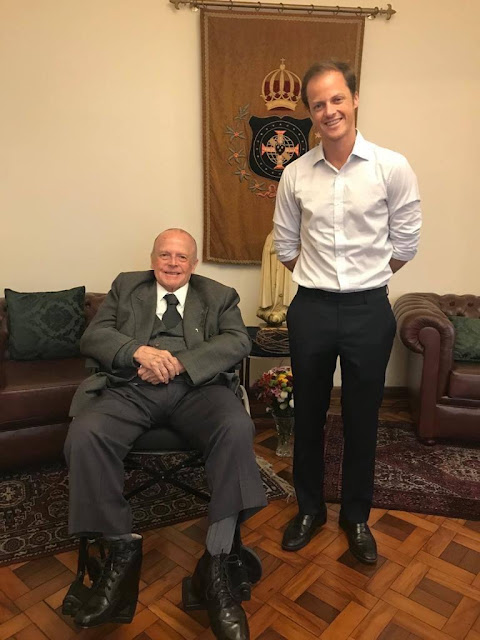The Imperial House of Brazil has suffered a significant loss with the passing of Prince Luiz, who served as its Head for forty-one years. Born in 1938, Prince Luiz was the eldest son of Prince Pedro Henrique of Orleans-Bragança and Princess Maria Elisabeth of Bavaria, and his life was marked by a deep connection to his family's history and legacy.
Prince Luiz's dedication to his heritage was evident throughout his life, particularly in his role as the Head of the Imperial House. Despite never marrying, he remained deeply attached to the memory of his parents and the traditions of the Imperial Family. His passing on July 15, 2022, at the age of eighty-four, marks the end of an era for the Imperial House of Brazil, leaving behind a lasting impact on the family's history and the country's cultural heritage.
what is the significance of prince luiz in brazilian history
Prince Luiz of Orleans-Bragança, who passed away in 2022, held significant importance in Brazilian history due to his role as the Head of the Imperial House of Brazil for forty-one years. Born in 1938, Prince Luiz was the eldest son of Prince Pedro Henrique of Orleans-Bragança and Princess Maria Elisabeth of Bavaria, and his life was marked by a deep connection to his family's history and legacy.
Throughout his life, Prince Luiz dedicated himself to preserving the traditions and heritage of the Imperial Family, despite never marrying. His dedication to his heritage was evident in his role as the Head of the Imperial House, where he worked to maintain the family's historical significance and cultural influence in Brazil.
Prince Luiz's tenure as Head of the Imperial House spanned a period of significant change in Brazil, including the transition from a military dictatorship to a democratic government. During this time, he played a crucial role in reorganizing the monarchist movement and linking monarchists across the country, contributing to a renewed vitality in the monarchist cause.
His passing marked the end of an era for the Imperial House of Brazil, leaving behind a lasting impact on the family's history and the country's cultural heritage. The significance of Prince Luiz in Brazilian history lies in his unwavering commitment to preserving the legacy of the Imperial Family and his efforts to promote the monarchist cause during a time of significant political change in the country.
what was prince luiz's relationship with the brazilian government
Prince Luiz of Orleans-Braganza, the Head of the Imperial House of Brazil, maintained a positive relationship with the Brazilian government during his lifetime. He expressed support for the economic policies of President Luiz Inácio Lula da Silva, stating that he was "very pleased with the economic performance of Brazil, all derived from the policy of Lula da Silva" and that he believed the government's choices were diminishing the economic gap among Brazilians.
did prince luiz have any political affiliations
Prince Luiz of Orleans-Braganza did not have any political affiliations. He was a member of the Brazilian Imperial Family and focused on preserving the legacy of the Imperial House of Brazil, rather than actively participating in political parties or campaigns.
 |
| Images of Prince Luiz throughout his life. Photo (c) Pró Monarquia. |
Today, on 15 July 2022 at São Paulo, Prince Luiz of Orleans-Bragança died after a month-long stay in hospital. He was eighty-four years-old. The prince was the Head of the Imperial House of Brazil for forty-one years.
 |
| The wedding of Prince Pedro Henrique of Brazil and Princess Maria Elisabeth of Bavaria |
 |
| A baby Prince Luiz. |
 |
| Four generations: The Countess of Caserta holding her great-grandson Prince Luiz, her daughter Princess Maria Pia, and her grandson Prince Pedro Henrique. |
 |
| Pedro Henrique and Maria Elisabeth with their three eldest children: Luiz (1938-2022), Eudes (1939-2020), and Bertrand (b.1941). |
Prince Luíz Gastão Maria José Pio of Orleans-Bragança was born on 6 June 1938 at Mandelieu, France. Luiz was the first son and eldest child of Prince Pedro Henrique of Brazil (1909-1981) and Princess Maria Elisabeth of Bavaria (1914-2011), who married in 1937. Born during the exile of the Imperial Family, Prince Luiz was registered at the Consulate General of Brazil in Paris as a Brazilian citizen, fulfilling the mandate of the Imperial Constitution, thus guaranteeing his rights to the Throne and the Crown of Brazil. The godparents of Prince Luiz were his uncle, Prince Ludwig of Bavaria (1913-2008), and his paternal grandmother, the Dowager Princess Imperial Maria Pia of Brazil (born Princess of the Two Sicilies; 1878-1973).
 |
| Princess Maria and Prince Pedro Henrique with their children, 1962. Photograph (c) Casa Imperial do Brasil. |
With the end of the World War II in May 1945, the Brazilian Imperial Family was able to return to their homeland. They lived in Rio de Janeiro and Petrópolis until, in 1951, they moved to the Northern of the State of Paraná, then the great agricultural frontier of Brazil, where they lived at the Fazenda São José, in Jacarezinho, and, from 1957 onwards, at the Fazenda Santa Maria, in Jundiaí do Sul.
 |
| Prince Luiz and his father Prince Pedro Henrique in the 1960s. |
Prince Luiz studied at the Colégio Coração Eucarístico and Santo Inácio, in Rio de Janeiro, and at Colégio Cristo Rei, in Jacarezinho. The prince then went to Europe, where he studied Political and Social Sciences at the University of Paris and Chemistry and Physics at the University of Munich. Luiz graduated with a degree in chemical engineering. He returned to Brazil in 1967, settling in São Paulo and taking over the direction of his father's Secretariat, which at that time was located at Sítio Santa Maria, in Vassouras.
 |
| Prince Pedro Luiz, Princess Amelia, Prince Antonio, the Duchess of Braganza, Prince Luiz, Princess Cristina, the Duke of Braganza, and Prince Bertrand, 2000. |
 |
| Prince Luiz with Archduchess Christiana of Austria and Prince Alexander of Saxony, Margrave of Meißen, who is married to Luiz's first cousin Princess Gisela of Bavaria. |
Prince Luiz was a first cousin of Archduke Leopold Franz of Austria, Head of the Grand Ducal House of Tuscany, and of Princess Gisela of Bavaria, Margravine of Meißen and wife of Prince Alexander, Head of the Royal House of Saxony.
 |
| Prince Pedro Henrique and Princess Maria Elisabeth. |
 |
| Prince Luiz and Princess Maria Elisabeth. |
Aged seventy-one, Prince Pedro Henrique of Orleans-Bragança died on 5 July 1981. Prince Luiz, his eldest son and dynastic heir, then became Head of the Imperial House. On 13 May 2011, Princess Maria Elisabeth, aged ninety-six, died. Prince Luiz, who never married, was always strongly attached to the memory of his parents.
 |
| Prince Luiz and his nephew Prince Rafael. |
One of the prince's hobbies was reading, especially on historical and sociological subjects, in addition to staying up-to-date on everything relevant happening in Brazil and around the world. In his youth, Luiz practiced riding and hunting. In later years, he resumed his passion for photography, revealing himself to be heir to the artistic vein of both sides of his family. Prince Luiz was particularly fond of classical music, with a special predilection for the works of Brazilian composers of the Baroque school.
May the Prince Rest in Peace.
As we conclude our tribute to Prince Luiz, it is essential to acknowledge the profound impact his life and legacy have had on the Imperial House of Brazil and the country as a whole. His dedication to preserving the traditions and heritage of the Imperial Family, despite never marrying, is a testament to his unwavering commitment to his family's history and legacy. Throughout his life, Prince Luiz remained deeply attached to the memory of his parents and the traditions of the Imperial Family, ensuring that their legacy lived on through his tireless efforts to promote the monarchist cause in Brazil. His passing marks the end of an era for the Imperial House of Brazil, leaving behind a lasting impact on the family's history and the country's cultural heritage.
As we bid farewell to Prince Luiz, we also acknowledge the significant role he played in reorganizing the monarchist movement in Brazil during a time of significant political change. His efforts to link monarchists across the country contributed to a renewed vitality in the monarchist cause, and his commitment to preserving the legacy of the Imperial Family will continue to inspire future generations. As we reflect on the life and legacy of Prince Luiz, we are reminded of the importance of preserving our cultural heritage and the significance of the Imperial House of Brazil in Brazilian history. His memory will continue to serve as a beacon of hope and inspiration for those who value the rich cultural traditions of Brazil and the world.
what was prince luiz's role in the brazilian imperial family
Prince Luiz of Orleans-Braganza played a significant role in the Brazilian Imperial Family as the Head of the Imperial House of Brazil for forty-one years. He was the eldest son of Prince Pedro Henrique of Orleans-Bragança and Princess Maria Elisabeth of Bavaria, and his life was marked by a deep connection to his family's history and legacy.



















No comments:
Post a Comment